 Petzlover
Petzlover Perro de Presa Mallorquin is originated from Spain but Smalandsstovare is originated from Sweden. Both Perro de Presa Mallorquin and Smalandsstovare are having almost same height. Perro de Presa Mallorquin may weigh 21 kg / 47 pounds more than Smalandsstovare. Both Perro de Presa Mallorquin and Smalandsstovare has almost same life span. Perro de Presa Mallorquin may have less litter size than Smalandsstovare. Both Perro de Presa Mallorquin and Smalandsstovare requires Low Maintenance.
Perro de Presa Mallorquin is originated from Spain but Smalandsstovare is originated from Sweden. Both Perro de Presa Mallorquin and Smalandsstovare are having almost same height. Perro de Presa Mallorquin may weigh 21 kg / 47 pounds more than Smalandsstovare. Both Perro de Presa Mallorquin and Smalandsstovare has almost same life span. Perro de Presa Mallorquin may have less litter size than Smalandsstovare. Both Perro de Presa Mallorquin and Smalandsstovare requires Low Maintenance.
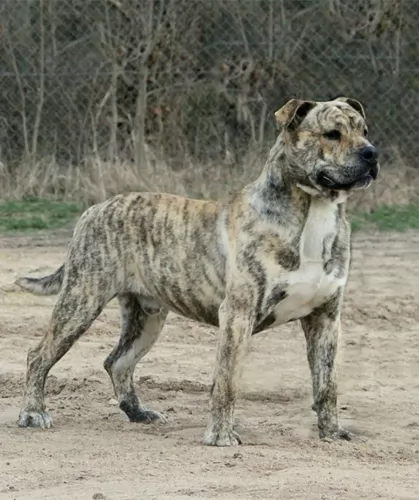 Known by several other names such as Majorca Mastiff, Perro Dogo, Ca de Bou and Mallorquin Bulldog among others, the Perro de Presa Mallorquin was almost extinct after World War II.
Known by several other names such as Majorca Mastiff, Perro Dogo, Ca de Bou and Mallorquin Bulldog among others, the Perro de Presa Mallorquin was almost extinct after World War II.
The British brought their own dogs with them into the Balearics, crossing them with native mastiffs. They were used for fighting, explaining why this dog also got the name Ca de Bou as it means Bull Dog.
It is believed that the dogs were crossed with the Perro de Pastor Mallorquin, Alano Espanol and the Bulldog.
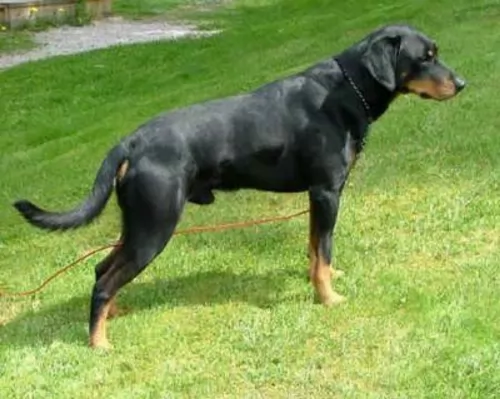 The Smålandsstövare has got quite a long history and dates back to the 1600s. He is the smallest of the Swedish hound breeds. This is a scenthound.
The Smålandsstövare has got quite a long history and dates back to the 1600s. He is the smallest of the Swedish hound breeds. This is a scenthound.
Hounds similar to the Smålandsstövare were bred with European hounds and then brought to Småland and bred with local spitz-type farm dogs to create the foundation stock for the Smålandsstövare.
The dog was used to hunt but nearly died out in the 20th century, but breeders restored it and the first official standard emerged by the Swedish Kennel Club in 1921.
The Smålandsstövare is a rare dog breed but it is recognized by the American Rare Breed Association as well as other major kennel clubs, one of which is the Federation Cynologique Internationale as well as the United Kennel Club.
 The Perro de Presa Mallorquin is a strong medium-to-large sized deep chested dog standing at between 52 and 58cm in height and weighing between 30 and 39kg, both male and female.
The Perro de Presa Mallorquin is a strong medium-to-large sized deep chested dog standing at between 52 and 58cm in height and weighing between 30 and 39kg, both male and female.
This is a molosser-type dog with a strong, powerful build and large head. The skin around the face is thick and loose. The coat of the dog is short and rough and the color is fawn to light brown and reddish tan shade He can also be brindle too or black with tan markings.
The jaw is strong, the ears short and floppy though they have always been traditionally cropped. When left they can be folded backward. The tail is long, set low and reaches to the hock.
This is an intelligent dog who is going to require training and socialization if you want to manage it properly. Training and socializing a dog can be very helpful and help a dog like this to be more obedient and well behaved.
As a puppy growing up with kids who have been taught to treat animals kindly and with respect, the Perro de Presa Mallorquin can get on well with children. However, if you’re bringing an older dog into your home, the very nature of the dog may mean it not getting on with children.
This dog is quiet by nature and will be loving and loyal towards his owner, being protective towards him. He is strong-willed and will do best with a strong, firm, kind, patient dog owner who is consistent.
He is active and will fit into life in the suburbs or the countryside as opposed to life on a tiny property in the city.
 The Smålandsstövare is a muscled, compact looking dog. The double coat is shortish to medium length and is thick and quite coarse to the touch. He sheds seasonally. The coat is usually black with tan markings.
The Smålandsstövare is a muscled, compact looking dog. The double coat is shortish to medium length and is thick and quite coarse to the touch. He sheds seasonally. The coat is usually black with tan markings.
The high set ears are medium length and floppy, the head is slim and the tail can be naturally short. Sometimes the tail is long and can be slightly curved in the spitz-like sabre fashion.
The eyes are brown and friendly. The height of these dogs is about 46 to 54cm and he weighs anything from 15 to 18kg.
Usually a well behaved, quiet, calm, gentle dog, the Smålandsstövare takes his role as guard dog seriously, wanting to protect his family.
His good temperament ensures he gets on well with all members of the family. He is full of energy and will need to be exercised well, whether it be ball games in the garden, a walk around the block, a run in the park or joining his family on hikes and camping trips.
It is why he won’t settle down well on a small property in the city. He needs larger premises to expend his energy, and if in cramped premises without exercise, he may resort to barking and whining and this may well drive your neighbors bats.
Training and socializing your Smålandsstövare will be necessary and it should be easy as he is intelligent.
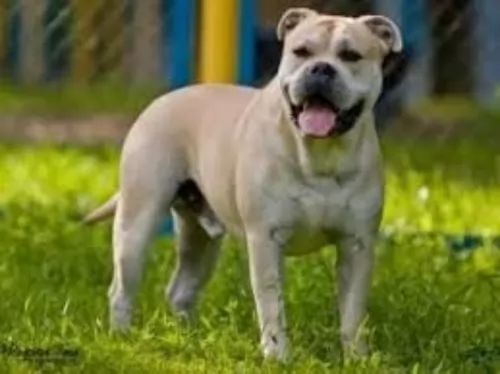 Your Perro de Presa Mallorquin is a loving dog, albeit it a bit stubborn. The key to having a dog with a sound temperament is to have him trained and socialized as this will do him the world of good and make him obedient and more balanced.
Your Perro de Presa Mallorquin is a loving dog, albeit it a bit stubborn. The key to having a dog with a sound temperament is to have him trained and socialized as this will do him the world of good and make him obedient and more balanced.
Irresponsible dog owners like to tie dogs like this up and leave them in the yard day after day to guard the home. They’re to blame when the dog becomes bored, frustrated and destructive.
Brought up correctly and given the right amount of love and care, the Perro de Presa Mallorquin is a brave, confident, quiet dog that can become a loyal and loving pet and companion.
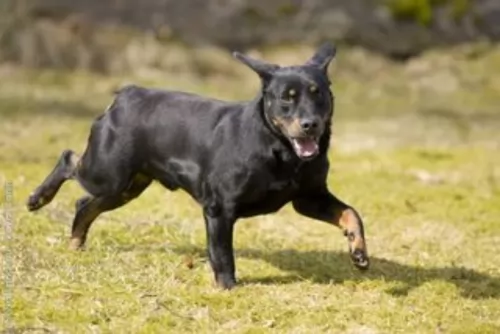 The Smålandsstövare is a robust dog with a lot of stamina. He will be wanting a lot of exercise and is ideal as a pet in the suburbs or the countryside but not ideal for city living.
The Smålandsstövare is a robust dog with a lot of stamina. He will be wanting a lot of exercise and is ideal as a pet in the suburbs or the countryside but not ideal for city living.
He makes a wonderful family pet, forming strong bonds with his owners. He makes an excellent watchdog too wanting to protect his family, and with this amicable, calm dog, you’re going to have a true friend.
 To avoid some of the common dog illnesses there are, you want to give your pet the best care possible. Of course there are always some dog illnesses that plague a dog and where he will require veterinary intervention. Hip dysplasia is one and larger dogs are more prone to getting this joint disease which can be very debilitating for your dog.
To avoid some of the common dog illnesses there are, you want to give your pet the best care possible. Of course there are always some dog illnesses that plague a dog and where he will require veterinary intervention. Hip dysplasia is one and larger dogs are more prone to getting this joint disease which can be very debilitating for your dog.
Other health issues can include osteosarcoma and lymphoma which are types of cancer Eye problems such as ectropion or entropion of the eyelids is where you'll find the eyelids turning either outwards or inwards. Also be aware of cataracts of the eyes as well as Cherry eye.
 The Smålandsstövare is a rare dog breed and not much is known about congenital conditions to which he may be particularly prone.
The Smålandsstövare is a rare dog breed and not much is known about congenital conditions to which he may be particularly prone.
With good care he can reach 14 or 15 years of age. The floppy ears put him at risk for ear infections, while other conditions to watch for include hip dysplasia, cancer, bloat and obesity.
If you see your dog shaking his head or pawing at his ears, look inside because the ears may be red and inflamed. It is important to get help quickly for ear problems in dogs.
Ear canals are sensitive so if you don’t want to clean the ear and work on it yourself it is important to get your pet to the vet. The vet will clean your dog’s ears and also prescribe antibiotics.
For future treatment, you will need to clean your dog’s ears and keep them dry. If you don’t want to do this yourself, make sure to get him to professional groomers who will do this for you.
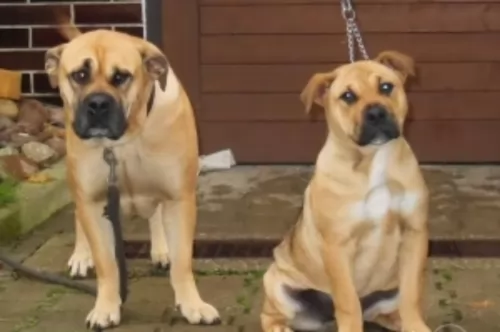 Your Perro de Presa Mallorquin is going to need a walk every day if you want him to be physically and mentally sound. He loves to sniff around and see the world beyond his garden.
Your Perro de Presa Mallorquin is going to need a walk every day if you want him to be physically and mentally sound. He loves to sniff around and see the world beyond his garden.
This is a low maintenance breed, requiring a brush twice a week just to maintain the coat in its heathy state and to remove loose hairs.
This purebred dog will need an adequate diet to keep him in tip top shape. He likes his food and because he is big and energetic, will require commercially manufactured dog food that is high in good quality protein. In fact always check the packaging that protein sources are among the top ingredients listed.
Growing puppies will require 4 helpings of food a day which can later become 2 meals a day.Try to include some home-made food for him. It doesn’t have to be complicated, in fact dogs want simplicity and consistency with their food so that they don’t get upset stomachs.
Boiled chicken, brown rice or pasta and cooked vegetables such as sweet potato, carrots and spinach chopped up and added into the kibble occasionally can be a wonderful tasty treat for your pet. It is also a good idea to try and give him some raw meat from time to time as well.
Avoid all spicy, unusual foods for your pet – he doesn’t want any surprises when it comes to his food. Ensure he always has a bowl of fresh, cool water available.
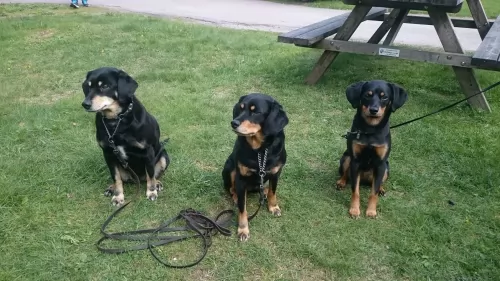 Choosing a good diet is imperative for the Smålandsstövare. Choose a commercially manufactured dog food high in vitamins and minerals.
Choosing a good diet is imperative for the Smålandsstövare. Choose a commercially manufactured dog food high in vitamins and minerals.
Give your dog a treat by providing him with some home-made food. It can be added into the dry kibble about twice a week as a treat. Boil brown rice and chicken in a pot and add in sweet potatoes, carrots and spinach. Chop all this up and give it to your dog in small portions. Also try to include some raw meat into the diet.
The Smålandsstövare is a very energetic breed and he is going to require some vigorous exercise every day. Take him for walks, allow him to run with you when you cycle or jog or take him swimming.